Aussie sporting star Jordan Mailata on his journey from Sydney to the Super Bowl
Aussie NFL champion Jordan Mailata is one of the country’s most successful athletes of all time. But his path from Sydney to Super Bowl glory with the Philadelphia Eagles has been anything but easy.
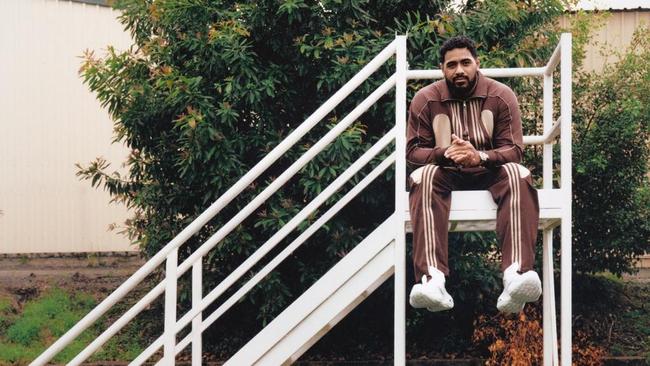
The confetti has fallen, the Gatorade has been dunked on the coach, the season is over and 6’8”, 166kg Aussie Jordan Mailata is crying into the chest of 6’6”, 141kg Lane Johnson. A few hours earlier, the two Philadelphia Eagles had been in the trenches.
It’s February 12, 2023, and less than four minutes into the NFL Super Bowl LVII, the Eagles are humming. Already, they’re only 11 yards out from the Kansas City Chiefs’ end zone. The play starts, and quarterback Jalen Hurts hands the ball off to the Eagles’ running back Boston Scott. Ahead of him, he sees a 150kg red-and-white mound of man right in his path. But in an instant, the Kansas City defender is gone. Mailata has shoved him to the ground. Scott’s 9-yard run sets up the Eagles’ unstoppable play: the now-infamous Brotherly Shove, aka the Tush Push.
The play, which is not unlike a rugby scrum but somehow messier and more brutal, sees the men throw their bodies into the breach, clearing space for Hurts to carry the ball forward. It always works, and now it does again: touchdown. The Eagles take the lead.
From then on, it’s a game for the ages. The Chiefs respond with a haymaker of their own. When the Eagles steal the lead back, the Chiefs tie it up again. Into the second half, the pattern repeats.
Throughout it all, Mailata plays a flawless game. When D-linemen try to reach the quarterback, they find themselves frozen in place. When Mailata has to clear space for his lighter, faster teammates, they run freely through the valleys he creates. But the Chiefs are just as clinical.
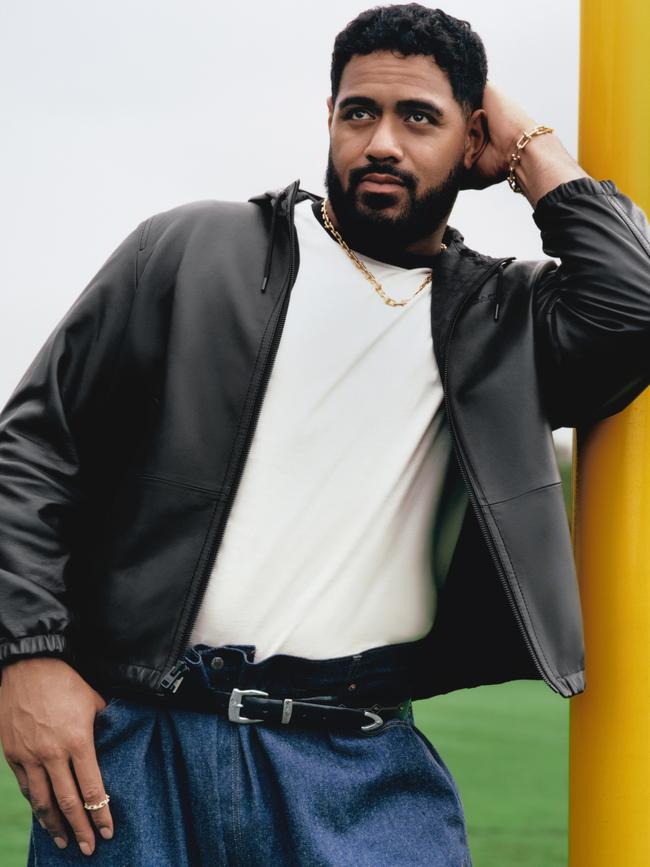
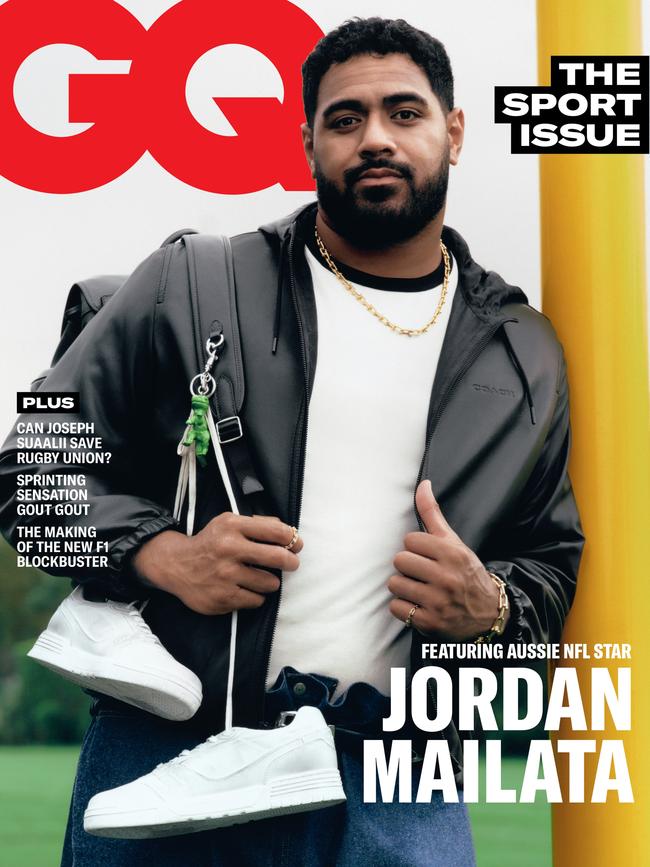
With five minutes left in the game, Kansas City are up by eight and the Eagles are on the Chiefs’ goal line again. They know the drill. The linemen make their usual sacrifice and throw themselves into harm’s way. It’s another touchdown; their team is within two points. Mailata ploughs a path to the end zone for his quarterback and lands the two-point conversion. The score is tied.
But, from that moment, they don’t get another real chance. The Eagles’ offence is on the sidelines, and they are forced to watch Patrick Mahomes and the Kansas City Chiefs as they trudge their way down the field to set up the game-winning field goal. It’s all over.
“I didn’t process it right away. It was hard for me,” Mailata says. “I was going through a lot right after that season.”
Like any sport, an NFL game can turn on a single moment. One minute it looks like victory, the next you’re staring at defeat. Mailata’s dream of winning the Super Bowl was done for now, but it wasn’t dead. He would just have to wait.
Mailata was raised in Bankstown, in Sydney’s southwest. He is the son of Samoan parents who immigrated to Australia, and the second youngest of five. His upbringing was one filled with family, food, music and a love for rugby league. His journey to the NFL has been remarkable, but it was one his family never wanted him to take; like all of his brothers, the dream was to make the Mailata name legendary in the NRL.
As a teenager, Mailata played for the Bankstown Bulls, gaining the attention of the Canterbury-Bankstown Bulldogs for his size and power. They gave him the call-up to the Under-18s, but a week out from his first game, it all came crashing down. Literally. Mailata, then 17, collapsed at training; he had a heart condition and both the upper and lower chambers of his heart needed to be repaired under the knife.
Mailata was off the field for a year. He put on weight and lost his fitness, but he kept going. After some impressive hit-outs in A-grade, he made his way back to the fringes of the NRL with a spot on the South Sydney Rabbitohs Under-20s squad. At contract time, Mailata was offered one year, $5000, and a spot on the development team. He turned it down.
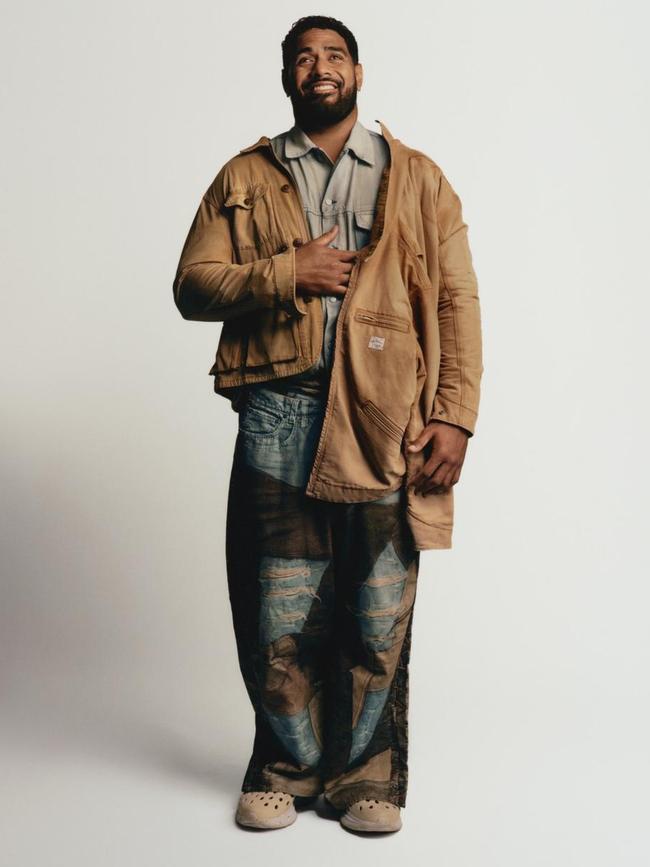
“They wanted me to lose 10 more kilos,” he says, “and I just had no more kilos to lose.”
Looking for other options, his agency put together a highlight reel. He’s twice anyone’s size and moves like it’s the running of the bulls; he’s one of the bulls. Eventually, it made it into the hands of a scout in the US, who offered Mailata the chance to make it in another country, another code: NFL. Mailata was itching to take it, but, following Samoan tradition, he asked his father for permission to uproot his life in Australia and take a chance on an American dream. His father said no.
“I was trying to break into rugby league and they really wanted me to see that through,” Mailata says, “I just didn’t understand why they wouldn’t want me to try it.”
Eventually, his father relented on one condition: that he give it everything he had. Looking back, Mailata’s still motivated by his family’s initial hesitation. “Now they’re really glad I did it,” he says, grinning, “I’m just like, it’s too late now, relax ... I thrive on that a lot. I’m a petty person. I love when people doubt me.”
One person who didn’t was Aden Durde, who was working at the NFL’s International Player Pathway program in the US. He had seen Mailata’s highlight video and was impressed.
“OK, this is intriguing,” Durde, now the defensive coordinator for the Seattle Seahawks, recalls thinking as he watched the clips of Mailata moving like a man half his size.
“You see physical traits. You want to get to know the person. You want to know, can some of their skills translate?”
Mailata, whose only exposure to the NFL at that point had been watching the halftime show, proved himself in the trial workout. Durde knew he had something special.
Very quickly—once he had convinced his family—Mailata went from part-time work on Sydney demolition sites with fading dreams of the NRL to Bradenton, Florida, for a three-month intensive training program at one of the best sporting academies in the world.
Six days a week, 12 hours a day, Mailata trained alongside five other international prospects to wrap his head around the NFL. Physically, Mailata adapted well, but the NFL is a game of mental chess that takes years to master at the highest level.
“To try to put it in terms that people understand,” says Durde, “it’s like you’re asking him to learn another language and then not just go to that country but go there and apply to be the CEO of a major company.”
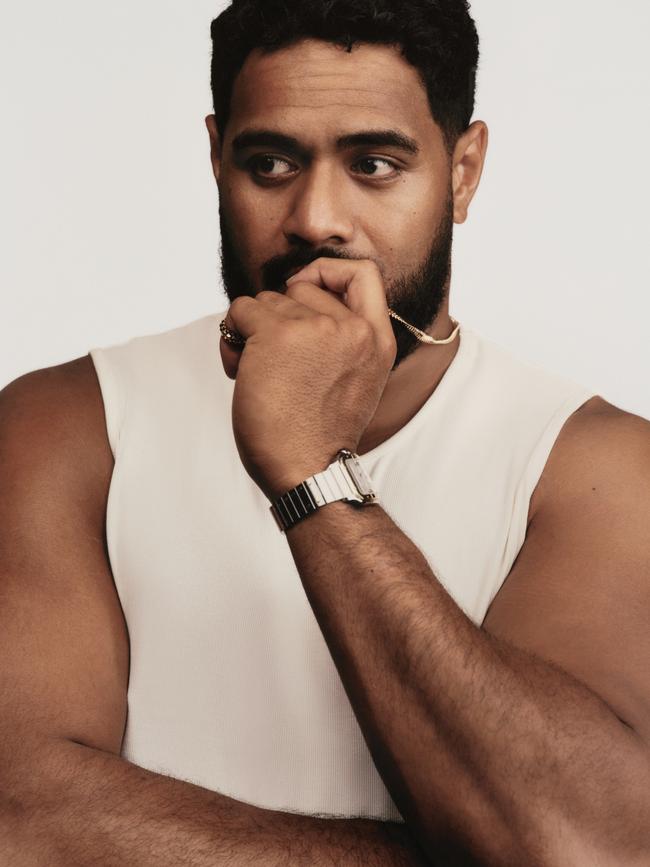
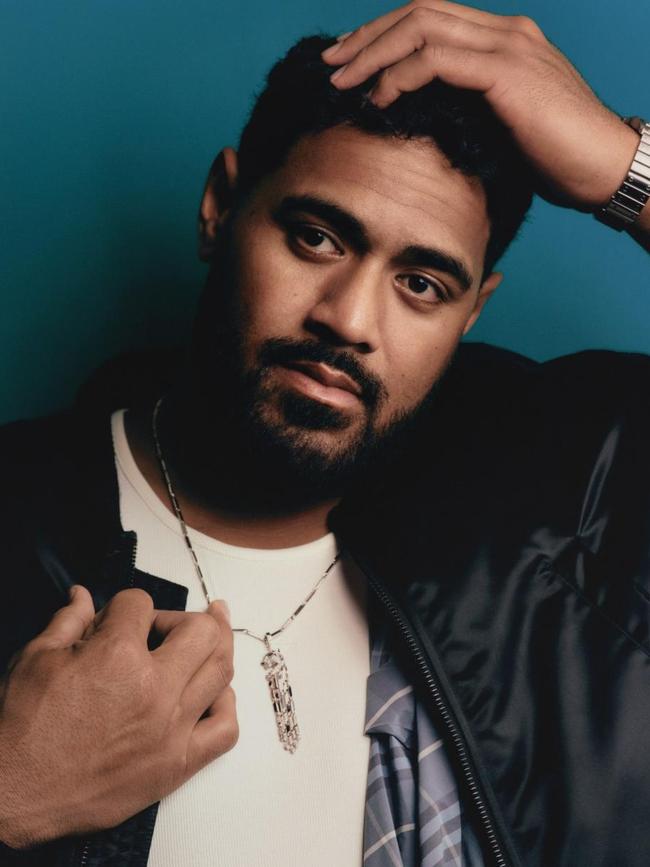
When Mailata first arrived in Florida he was under the impression he would play running back.
“Have you seen the movie The Blind Side?” his coaches asked him. “We want you to play left tackle, like Big Mike.”
“I was like, ‘Faaaar ooouuut. Yes, I know that movie’,” says Mailata, laughing. As a teenager in Australia, Mailata was called Big Mike after the hulking high schooler. “It used to piss me off!”
When they first encounter the game, people who know American football from Friday Night Lights or, like Mailata, the halftime show, can be put off by its complexity. NFL squads have 53 players, some play only offence, some only defence, and a few only play for punts and field goals. Most people are familiar with quarterbacks—they throw the ball, they’re the superstars. Some know the flashy wide receivers and electric running backs. Hell, if you like seeing big hits, you might be familiar with defenders like linebackers and cornerbacks. But, outside the cult of gridiron fans, few people pay attention to the tackles.
The left tackle’s role is to block the other team’s defence from reaching the highly valued quarterback—Patrick Mahomes, for example—or the running back and disrupting a play. Boiled down to its essence, it’s a case of moving someone, often one of the best athletes in the world, who doesn’t want to be moved and not allowing yourself to be moved when you don’t want to be moved. It’s tough, relentless work.
But tackle is also a position of contradictions: it looks slow but requires fast feet; it calls for intense concentration but it can be monotonous and repetitive; it rarely makes the highlights reel but it’s one of the highest-paid positions in sport. But before Mailata could actually play the position, someone needed to take a chance on him.
The wait at the NFL Draft is notoriously excruciating. One phone call can change your life. But they aren’t guaranteed to every hopeful, especially when it comes to the last day. In April 2018, in a room in Dallas, Mailata was playing the waiting game.
“The Dallas Cowboys select ... Dalton Schultz, tight end, Stanford”. The crowd cheers, or boos, with each name as those called up to the stage walk off with a new home and a new life. Mailata waits, his big body stretched awkwardly across a leather sofa like he’s in the bardo of a long airport layover.
A few hours in on the final day, his phone rings; it’s a Green Bay area code—the Green Bay Packers are one of the most legendary and successful franchises in the NFL. A voice comes onto the line: “Hey, just wondering if this was the number to call. OK, bye.”
False alarm.
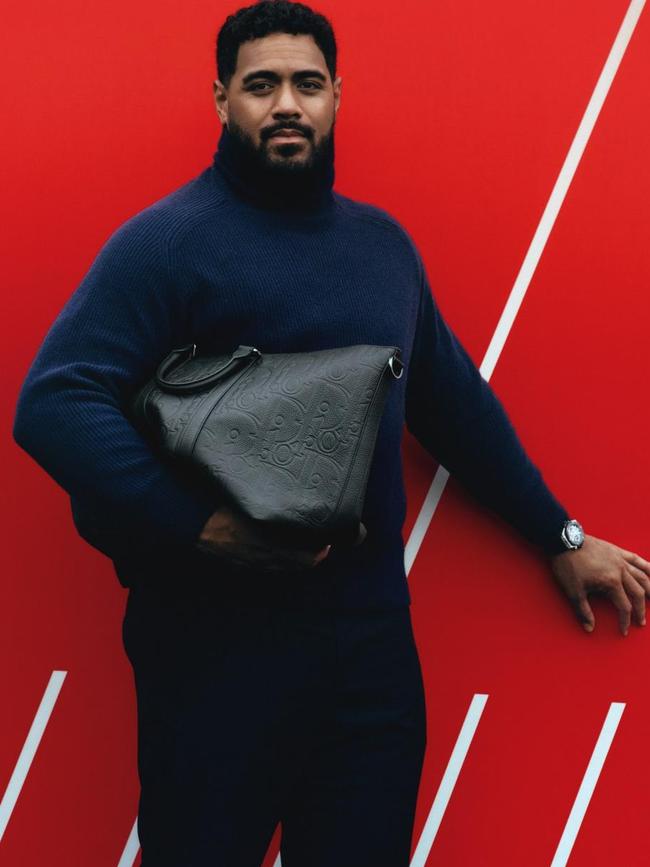
Soon, the phone lights up again, this time it’s from someone at the New York Jets. “We’re just wondering if you don’t get drafted, could you consider signing with us in free agency?” It’s not all bad. But undrafted players rarely get the investment that comes with a team using a coveted draft pick to nab them.
By 4.30pm, it’s the final round and nerves are fraying. The phone, so far only a source of betrayed hope, rings again. “Jordan,” says a voice Mailata recognises, “We’re picking you right now. You’re an Eagle bro.” It’s the Philadelphia general manager, Howie Roseman. Mailata bursts into tears. Moments later, he’s on stage: “With the 233rd pick in the 2018 NFL Draft, the Philadelphia Eagles select Jordan Mailata, tackle, Sydney, Australia.”
“The catalyst,” Mailata calls that moment now. “It was the start of everything.”
Three years later, after a promising 2020 season, Eagles head coach Nick Sirianni breaks the news to the rabid Philadelphia press: after battling for the left tackle position all off-season, Mailata has won the starting job. His agent called him up. It’s contract time. What’s his target number? Mailata tells him $10 million. “Per year or total?” his agent asks. “Total. I think that’s a reasonable number,” Mailata responds.
His agent laughs and says he’ll get back to him. Soon, he has an answer.
If Souths offered him a footnote, this was an encyclopedia. Mailata’s contract would be worth a maximum of US$64 million ( just shy of $100 million) across four years. “I was just like, baffled,” he says. “That was life- changing, man. Just the security, that was nice to have. A blessing.
Money can change a person, but it also changes the world around them. At the end of an NFL Films short on Mailata, his sister, Sese, says, “How do you put into words that feeling where you’re speaking to your younger sibling knowing that they’ve changed the course of every generation to follow and changed the Mailata generation forever.”
When we read it to Mailata now, he laughs. “Did you miss the line where I said she still had to work?” he jokes, before becoming serious again. “I love how my sister says that. It’s nice to know that, but it comes with responsibility.”
It doesn’t help that his contract has made plenty of headlines back home. “The Daily Telegraph is like ‘$100 billion man!’,” laughs Mailata. “Why are you doing that? You’re pumping so much gas into the story. Please settle down, pump the handbrake, please. Do you not know how contracts work?’”
NFL deals are complex with unguaranteed money, incentives and multi-year structures that mean players rarely get the maximum value of a deal. Then there are the state and federal taxes (about 40 per cent) and the fees.
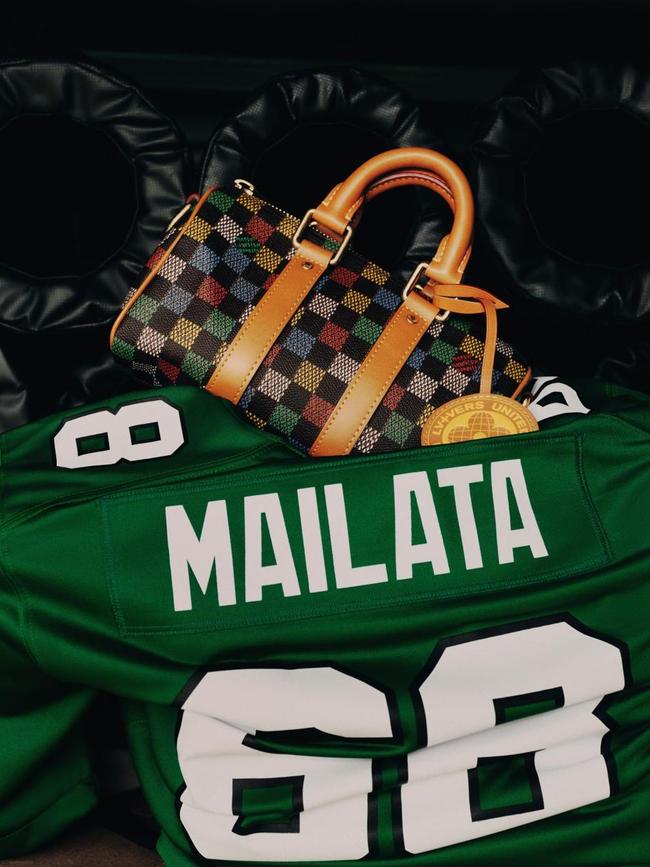
“It’s really decent,” says Mailata of what he takes home, “but they don’t know that I live on a budget because I want to prolong my wealth. These are conversations that, to this day, I still have with my family and they don’t understand. ‘You didn’t even want me to go!’ See, now I’m being petty.”
In the years since, Mailata has proved he’s worth the money. And he’s loving the game, too. He loves blocking for his superstar running back, Saquon Barkley, and watching him do something unthinkable, like a spin move into a reverse hurdle (look it up). He loves sealing his end of the great wall that is the Philadelphia Eagles’ O-line so Jalen Hurts can throw a deep ball to AJ Brown. He loves play after play of consistent physical and mental dominance.
It’s this relentless passion that has made Jordan Mailata from Bankstown—someone who just seven years ago had never even seen a NFL game—the highest-ranked player at his position in the entire league.
“Be where your feet are at,” Mailata tells his younger teammates. “It is the Super Bowl, but don’t make the moment bigger than it needs to be.”
Two years have passed since he embraced his teammate in tears after the Eagles’ crushing 2023 loss. Now the team is in New Orleans, once again playing for all the marbles, against the Kansas City Chiefs.
The game starts and right away, the Eagles are on. Hurts leads a meticulous drive down the field that ends in a tush push for a touchdown. Picking himself up off the pile of bodies, Mailata stands next to Hurts and they barely celebrate. They’ve been here before and lost. They’re acting like it.
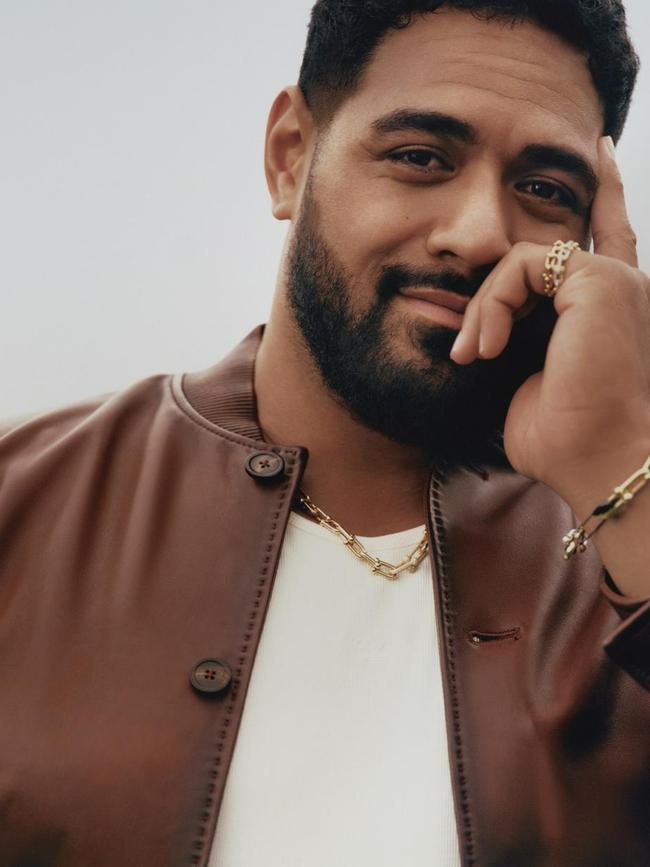
The second quarter scoring starts with an Eagles field goal. Then, Chiefs quarterback Patrick Mahomes throws his first touchdown of the game—it’s an interception to Philadelphia’s Cooper DeJean. 17-0, Eagles. With 1:49 left in the half, Mahomes looks set to drive down the field and put his team on the board. The snap is taken immediately and his left tackle is moved backwards, like he’s stumbling downhill, into Mahomes, who, under pressure, throws another interception. Ten seconds later, Mailata does what his opposite number couldn’t, seals the edge with ease, and Hurts slings it over his head to AJ Brown for an effortless touchdown. At half time, it’s 24-0 to the Eagles.
Even now, the Eagles keep a level head. Kansas City are back-to-back Super Bowl champions for a reason. As Kendrick Lamar plays his halftime show—the only reason Mailata used to watch the Super Bowl—they tell each other to keep the pressure on.
In the third quarter, it hits them. The Eagles snap the ball at the Chiefs’ 46-yard line. Mailata slides to his right as his teammate, big Mekhi Becton, pulls behind him to open a hole for Barkley to run through. But instead of handing it off to the running back, Hurts keeps the ball, and with time behind his brick wall linemen, he launches it. The ball lands in receiver Devonta Smith’s outstretched arms like a raindrop into a river. Touchdown.
“It was that Devonta Smith dagger,” says Mailata. “That was the moment where I was like, ‘Yeah, you know what, it doesn’t matter what they throw. We’re gonna win this game because they can’t mess with us right now. We are firing on all cylinders, and we’re going to make it happen. We’re gonna see it through to the end’.”
This time the confetti is green and white; the demons of 2023 are exorcised. Mailata is the first Australian to actually play in and win a Super Bowl. But the result didn’t hit right away. “I thought I’d be more emotional,” says Mailata of the aftermath. Even standing on the stage with the Vince Lombardi Trophy, holding the Australian and Samoan flags high with pride, the rush of feeling didn’t arrive. What he learned back in 2023 about losing held true for winning, too. “I am proud, and I am grateful,” he says. “But I’m over that shit, I’m on to the next.”
Mailata, now 28, is the sort of man that people whisper about when he walks past. “That guy is huge, does he play football?” Recently though, people on the street aren’t asking the question. They know who he is. In Philadelphia, that’s been the case for a while.
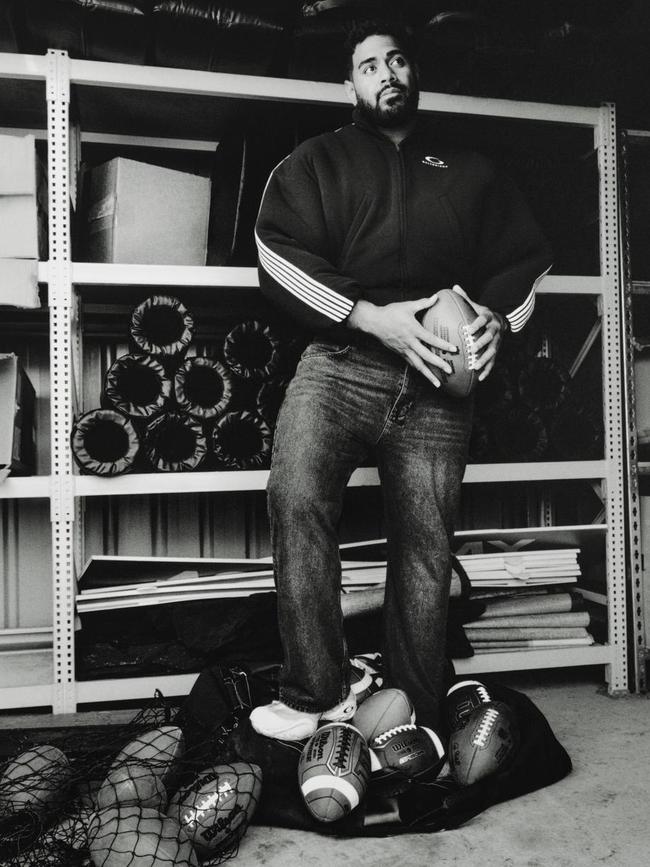
“I leave my front door, it’s ‘Go Birds’ or ‘Oh, hey, Jordan, can you take a photo?’.” Mailata says. “These fans are diehard.” It’s the sort of place where if you win a Super Bowl, people will be picking up the cheque for you for the rest of your life.
But they can also be unforgiving. Mailata has been a singer all his life—he went viral for performing Stevie Wonder’s “Isn’t She Lovely” at his wedding—and in 2022, 2023 and 2024, he made a Christmas album that featured his fellow offensive lineman Jason Kelce and Lane Johnson, as well as stars from Stevie Nicks to Patti LaBelle. The albums were made for charity—they raised over US$7 million for local programs, non-profits and buying a holiday gift for every public school kid in Philly—but one Christmas, off the back of three straight Eagles’ losses, not everyone was feeling charitable. Driving out of the team’s training facility, Mailata heard a thick Philly accent: “Hey Mailata! Stop singing fucking Christmas carols and learn how to pass block!”
Philadelphia ran another Australian favourite out of town: NBA player Ben Simmons. Mailata laughs when it’s brought up. “It’s pretty simple to play in Philly,” he says, shaking his head. “You give everything, the fans will love you. You don’t give everything, they bully you out of town. And that’s what happened to Benny. Take ownership when you fuck up, it’s as simple as that. If you start pointing fingers at fans, you might as well just say, ‘Hey, can I get a trade please?’.”
For a professional, media-trained athlete, Mailata is remarkably candid. But he’s also come to learn that the press can be hostile. They can be “piranhas”, “vultures”, he says. Though one of the biggest lessons he learned about media politics came from an unlikely source: the prime minister.
The day before the 2023 Super Bowl, Anthony Albanese called to wish Mailata luck. “What an honour,” he thought, at the time. But it turned out it wasn’t just a personal call. “Super Bowl morning, the first thing I see is a picture of my big-ass face and then hear me on the phone talking to him. I’m like, ‘What? This is insane. This guy’s recorded me?’.”
A video of the conversation appeared on Albanese’s official social media channels. Did he hear from the PM again this year? “He didn’t call me this time,” says Mailata.
Mailata isn’t an Australian citizen despite being born in Bankstown and growing up here; he still only holds that status in New Zealand. And although he says there have been assurances from the Australian government that they would fast-track his citizenship, so far nothing’s come to pass. “You see Albanese’s people, tell [the PM] I need citizenship,” he says, using a more colourful term to refer to the nation’s leader. (Mailata later clarified to GQ that the comment was made in good humour and that he has a strong relationship with the prime minister. Though his team maintains they were not aware the phone call was recorded. The prime minister’s office did not respond to repeated requests about the call or Mailata’s citizenship status.)
Philadelphia has become home, but regardless of any citizenship issues, Mailata hasn’t left Australia behind. And, after years now of being embraced in Philly, he’s noticing the attention more and more in Australia, too. “Just seeing how many people recognise me is still weird,” he says, “I only come [home] once a year and during that time—a year—the growth has just been absolutely insane.”
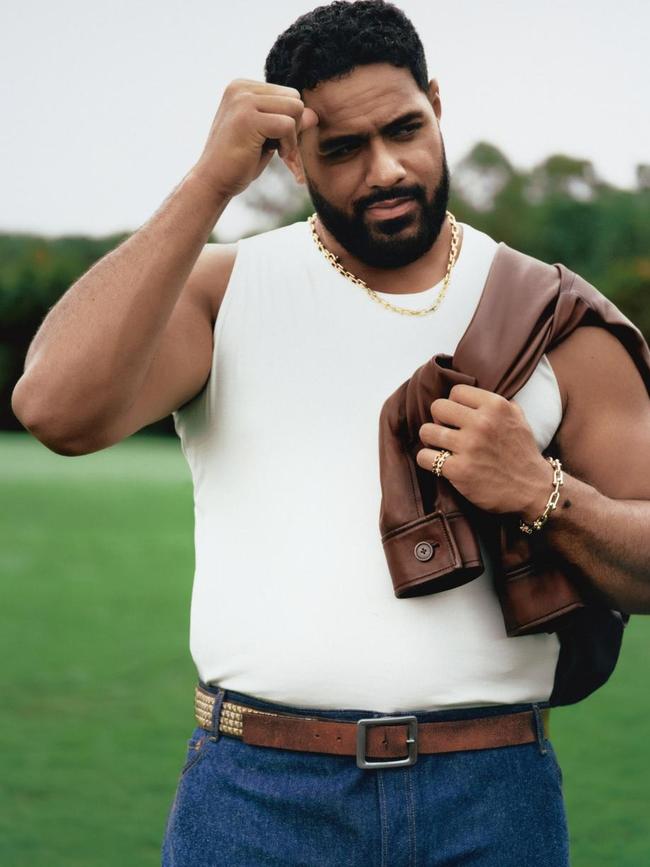
The NFL has been America’s biggest sporting league for half a century, but recently its ambitions extended beyond its borders. The league has set up an office on the Gold Coast, where Charlotte Offord, NFL general manager of Australia and New Zealand, has been building operations for the past three years. Not that the NFL wasn’t already popular here. When Offord arrived, there were an estimated 5.7 million Australian fans, but that number has leapt to 7.5 million. “We’ve seen enormous growth, but outside of the core numbers, we also see it anecdotally,” Offord says. “We’ve got people like Jordan Mailata—and now with Jordan Petaia [the former Wallabies star turned LA Chargers tight end] as well—removing that perception that the NFL is far away. You’ve got someone who grew up in the same town as you, in the same country as you. Now they are playing in the NFL, achieving success.”
The NFL doesn’t want to replace the NRL or AFL, but much like Formula One, the Premier League or the NBA, it has realised that the fight for eyeballs is a global one. In Australia, Mailata plays a key role in the sport’s expansion as an ambassador for the recently opened NFL Academy on the Gold Coast.
The academy hosts tryouts across Australia, New Zealand and the Pacific for young men aged between 12 and 18 as it looks to find the next Jordan Mailata. There are currently eight athletes in the program, focused on learning the game and drilling technique. In the next five years, the academy aims to grow that to 55, prospects who will play games in Australia and the US before a tilt at a college squad.
It’s a more likely pathway than the one Mailata followed—after all, he was in his early twenties by the time he picked up a NFL ball—and it also gives the NFL a greater chance at more local heroes in Australia; more players for people to get behind.
The academy is just the start. After playing games in London, Mexico City, São Paulo and across Germany, next year the NFL will hold a regular season game in Melbourne for the first time, packing out the MCG with 100,000 fans. The Philadelphia Eagles, Los Angeles Rams, Las Vegas Raiders and the Seattle Seahawks have been given exclusive marketing rights by the NFL to operate in Australia, and are working hard to build their fan bases here.
Meanwhile, the NFL has introduced flag football programs, a non-contact version of the sport, for all ages in a push towards Los Angeles 2028, where it will be introduced to the Games for the first time. But just seven years into his career, Mailata is more than just a champion athlete. He’s a role model, a natural leader, a hard worker who fills the game with fun and holds his teammates accountable.
“He’s always had the traits to be a leader,” says Durde. “I think now he has confidence and he’s established, you can see how his mentality comes out in that line and the way they play.”
The day after flying in from the States, Mailata is on the field running drills at the academy, working one-on-one with each athlete. When he’s back overseas, he mentors them via regular phone and video calls. “I want to start my own O-line Academy, so instead of families paying other people who have never played in the NFL, they can pay me,” says Mailata, cheekily, of life after football. “Somebody who’s actually played in the NFL? That’d be nice.”
He’d start it in America, but eventually he wants to bring it out to Australia. “The more we can get out into the community, the better,” he says, “And yeah, I just want to keep representing The Area.” On this trip he also has the chance to see his family. But it’s tough. Mailata has two days in Sydney before heading back to Philadelphia. “There’s not enough time to spend it with everyone, you know?” he says. “Every time we go back, we try to do just one big feast at Mum and Dad’s.”
In April 2024, Mailata signed a three-year contract extension worth up to US$66 million, putting him among Australia’s highest-paid athletes. The money, the Super Bowl ring—they’re all nice of course. But ultimately he says that’s not what really matters. “The thing I’m most proud of, it’s not the Super Bowl. It’s not being drafted. It’s just the fact that every time I run out of that tunnel, everyone sees ‘Mailata’,” he says.
“That’s my dad’s name.”
PRODUCTION CREDITS:
Photography: Levon Baird
Styling: Ewan Bell
Grooming: Chris Coonrod
Art direction: Giuseppe Santamaria
Production: Nicola Sevitt



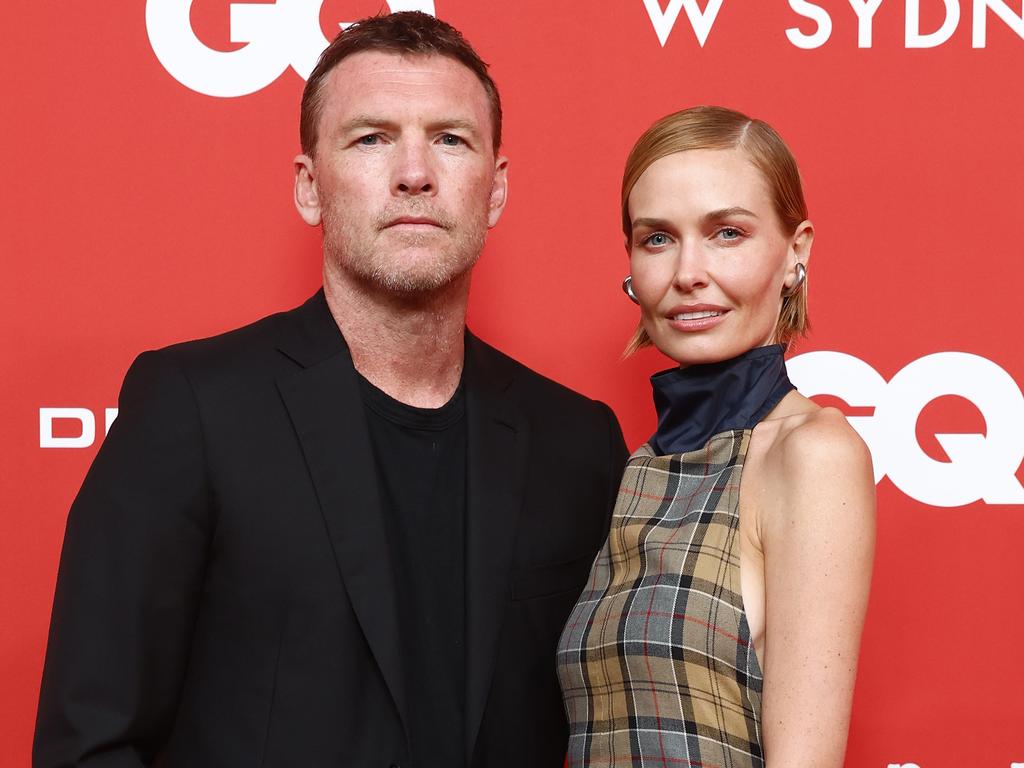
To join the conversation, please log in. Don't have an account? Register
Join the conversation, you are commenting as Logout